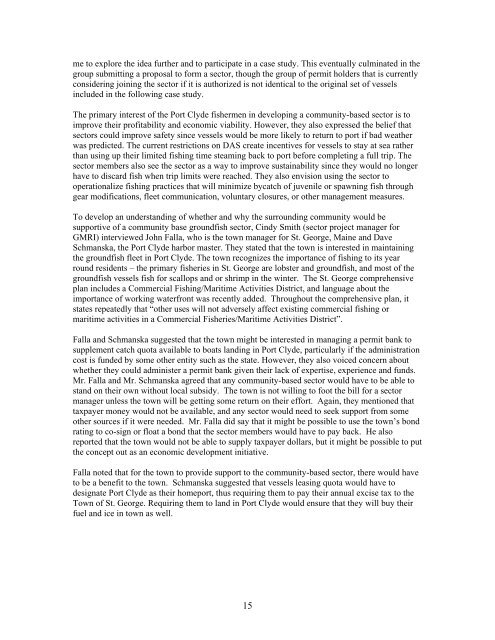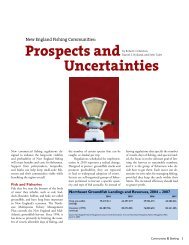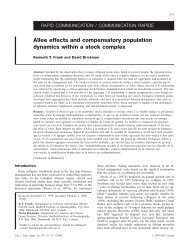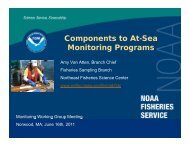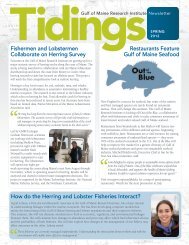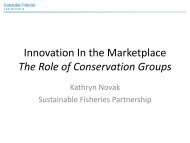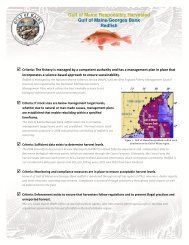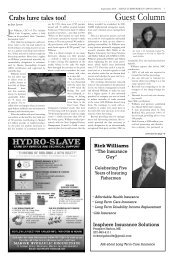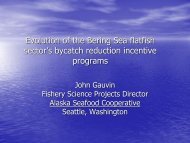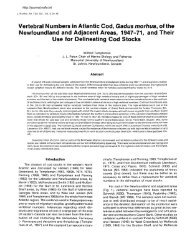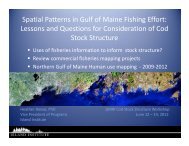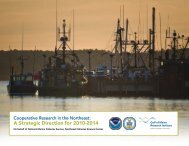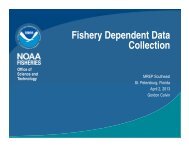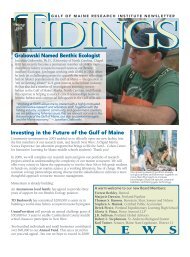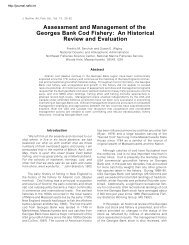Community-based Sectors for the New England Groundfish Fishery
Community-based Sectors for the New England Groundfish Fishery
Community-based Sectors for the New England Groundfish Fishery
You also want an ePaper? Increase the reach of your titles
YUMPU automatically turns print PDFs into web optimized ePapers that Google loves.
me to explore <strong>the</strong> idea fur<strong>the</strong>r and to participate in a case study. This eventually culminated in <strong>the</strong><br />
group submitting a proposal to <strong>for</strong>m a sector, though <strong>the</strong> group of permit holders that is currently<br />
considering joining <strong>the</strong> sector if it is authorized is not identical to <strong>the</strong> original set of vessels<br />
included in <strong>the</strong> following case study.<br />
The primary interest of <strong>the</strong> Port Clyde fishermen in developing a community-<strong>based</strong> sector is to<br />
improve <strong>the</strong>ir profitability and economic viability. However, <strong>the</strong>y also expressed <strong>the</strong> belief that<br />
sectors could improve safety since vessels would be more likely to return to port if bad wea<strong>the</strong>r<br />
was predicted. The current restrictions on DAS create incentives <strong>for</strong> vessels to stay at sea ra<strong>the</strong>r<br />
than using up <strong>the</strong>ir limited fishing time steaming back to port be<strong>for</strong>e completing a full trip. The<br />
sector members also see <strong>the</strong> sector as a way to improve sustainability since <strong>the</strong>y would no longer<br />
have to discard fish when trip limits were reached. They also envision using <strong>the</strong> sector to<br />
operationalize fishing practices that will minimize bycatch of juvenile or spawning fish through<br />
gear modifications, fleet communication, voluntary closures, or o<strong>the</strong>r management measures.<br />
To develop an understanding of whe<strong>the</strong>r and why <strong>the</strong> surrounding community would be<br />
supportive of a community base groundfish sector, Cindy Smith (sector project manager <strong>for</strong><br />
GMRI) interviewed John Falla, who is <strong>the</strong> town manager <strong>for</strong> St. George, Maine and Dave<br />
Schmanska, <strong>the</strong> Port Clyde harbor master. They stated that <strong>the</strong> town is interested in maintaining<br />
<strong>the</strong> groundfish fleet in Port Clyde. The town recognizes <strong>the</strong> importance of fishing to its year<br />
round residents – <strong>the</strong> primary fisheries in St. George are lobster and groundfish, and most of <strong>the</strong><br />
groundfish vessels fish <strong>for</strong> scallops and or shrimp in <strong>the</strong> winter. The St. George comprehensive<br />
plan includes a Commercial Fishing/Maritime Activities District, and language about <strong>the</strong><br />
importance of working waterfront was recently added. Throughout <strong>the</strong> comprehensive plan, it<br />
states repeatedly that “o<strong>the</strong>r uses will not adversely affect existing commercial fishing or<br />
maritime activities in a Commercial Fisheries/Maritime Activities District”.<br />
Falla and Schmanska suggested that <strong>the</strong> town might be interested in managing a permit bank to<br />
supplement catch quota available to boats landing in Port Clyde, particularly if <strong>the</strong> administration<br />
cost is funded by some o<strong>the</strong>r entity such as <strong>the</strong> state. However, <strong>the</strong>y also voiced concern about<br />
whe<strong>the</strong>r <strong>the</strong>y could administer a permit bank given <strong>the</strong>ir lack of expertise, experience and funds.<br />
Mr. Falla and Mr. Schmanska agreed that any community-<strong>based</strong> sector would have to be able to<br />
stand on <strong>the</strong>ir own without local subsidy. The town is not willing to foot <strong>the</strong> bill <strong>for</strong> a sector<br />
manager unless <strong>the</strong> town will be getting some return on <strong>the</strong>ir ef<strong>for</strong>t. Again, <strong>the</strong>y mentioned that<br />
taxpayer money would not be available, and any sector would need to seek support from some<br />
o<strong>the</strong>r sources if it were needed. Mr. Falla did say that it might be possible to use <strong>the</strong> town’s bond<br />
rating to co-sign or float a bond that <strong>the</strong> sector members would have to pay back. He also<br />
reported that <strong>the</strong> town would not be able to supply taxpayer dollars, but it might be possible to put<br />
<strong>the</strong> concept out as an economic development initiative.<br />
Falla noted that <strong>for</strong> <strong>the</strong> town to provide support to <strong>the</strong> community-<strong>based</strong> sector, <strong>the</strong>re would have<br />
to be a benefit to <strong>the</strong> town. Schmanska suggested that vessels leasing quota would have to<br />
designate Port Clyde as <strong>the</strong>ir homeport, thus requiring <strong>the</strong>m to pay <strong>the</strong>ir annual excise tax to <strong>the</strong><br />
Town of St. George. Requiring <strong>the</strong>m to land in Port Clyde would ensure that <strong>the</strong>y will buy <strong>the</strong>ir<br />
fuel and ice in town as well.<br />
15


